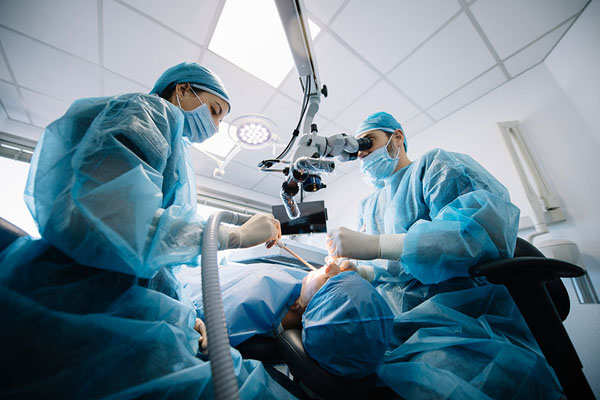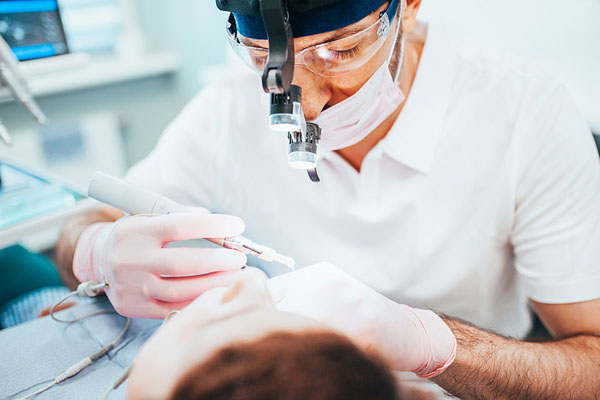Restore Your Oral Health and Smile With Off the Trace Dental!
When you think about dental hygiene, regular brushing, flossing, and biannual dental cleanings near you probably come to mind. But sometimes, despite our best efforts, a deeper level of cleaning is needed to maintain optimal oral health. This is where gross debridement cleaning comes in.
Our Slidell dentist breaks down what gross debridement cleanings are and when a patient may need one. If you need to schedule an appointment for a cleaning, call our Slidell dental office at (985) 214-0818. We also proudly serve patients coming from New Orleans, Lacombe, and Mandeville.
What Is a Gross Debridement Cleaning?
A gross debridement cleaning is a type of deep cleaning performed by a dental hygienist or dentist. It’s typically done when a patient has not had a dental cleaning in a long time, and there’s a significant buildup of plaque and tartar on the teeth and gums.
During a full mouth debridement procedure, the dental professional will use specialized instruments to remove the buildup of plaque, tartar, and other debris from the teeth and gums. This process may take longer than a typical dental cleaning and may be more uncomfortable for the patient due to the amount of buildup that needs to be removed.
Debridement cleanings aren’t a substitute for regular dental cleanings. It’s typically the first step in treating severe periodontal disease or when a patient has neglected their dental hygiene for a long period.
The Benefits of Gross Debridement Cleanings Near
There are several benefits to gross debridement cleanings, including:
- Removes plaque and tartar buildup above and below the gum line
- Helps prevent gum disease and tooth decay
- Promotes healthy gums and teeth
- Reduces inflammation
- Prevents infection and promotes healing
- Improves overall oral health and hygiene
- Helps maintain a bright and healthy smile
When Gross Debridement Cleaning Is Necessary
Gross debridement cleaning is typically recommended when there’s excessive plaque and tartar buildup that hasn’t been addressed through regular cleanings in many years. This can lead to periodontal disease, tooth decay, and other oral health issues.
Our Slidell dentist may recommend this type of cleaning if you have:
- Excessive plaque and tartar buildup on the teeth
- Bleeding gums when brushing or flossing
- Persistent bad breath or a bad taste in the mouth
- Swollen or tender gums
- Loose teeth or changes in the way your teeth fit together when you bite
- Receding gums or teeth that appear longer than normal
- Pus or other signs of infection around the teeth or gums
Contact Off The Trace Dental today to schedule your appointment.
How a Debridement Cleaning Works
Full mouth debridement cleanings involve several steps to ensure thorough cleaning of your teeth and gums. The process typically takes between one to four hours to complete and involves the following:
- Evaluation: The first step in the gross debridement cleaning process is an evaluation of your oral health. This will include x-rays and an examination of your teeth, gums, and periodontal pockets.
- Scaling: The next step is scaling, which involves the removal of plaque and tartar buildup above and below the gum line using specialized tools.
- Root Planing: Once scaling is complete, Dr. Pamela Daigle will move on to root planing, which involves smoothing out the roots of your teeth to prevent further plaque buildup.
- Antibacterial Rinse: After scaling and root planing, your Slidell dentist will use an antibacterial rinse to remove any remaining bacteria and promote healing.
- Post-cleaning evaluation: Dr. Daigle will evaluate the patient’s oral health again after the cleaning is complete to determine if additional treatments, such as fluoride treatment or periodontal therapy, are necessary. They may also provide recommendations for at-home oral hygiene care and schedule the patient for regular dental cleanings to maintain good oral health.
The process can be uncomfortable for some patients, but our Slidell dentist will use a local anesthetic to numb the area and make the procedure more comfortable.
Caring for Your Teeth After Your Debridement Cleaning Near Mandeville
After you’ve had a debridement cleaning, you’ll want to care for your teeth and gums properly to promote healing and prevent future buildup. Here are some tips for caring for your teeth after a debridement cleaning:
- Gentle Brushing: Your gums might be sensitive after the cleaning. Use a soft-bristled toothbrush to gently brush your teeth twice a day. Ensure you are using fluoride toothpaste to protect against cavities.
- Floss Carefully: Floss once a day to remove food particles and plaque between teeth. Be gentle to avoid injuring the gums.
- Rinse With an Antimicrobial Mouthwash: A dentist near you might recommend using an antimicrobial mouthwash to help reduce bacteria in the mouth. This can aid in healing and reduce the risk of infection.
- Avoid Harsh Foods: For the first day or two, avoid foods that are hard, crunchy, or spicy. These can irritate your gums or cause discomfort.
- Limit Sugary Foods and Beverages: Sugars feed the bacteria in your mouth, which produce acids that can erode enamel and cause cavities.
- Use Over-the-counter Pain Relievers: If you experience discomfort, consider taking an over-the-counter pain reliever as directed. Always consult with a dentist or doctor near you before starting any medication.
- Regular Dental Cleanings: To prevent the need for future debridement cleanings, schedule regular dental cleanings as recommended by your dentist. Typically, a cleaning every six months is suggested, but Dr. Pamela Daigle has specific recommendations for you based on your oral health.
- Maintain a Good Oral Hygiene Routine: Establishing a consistent oral care routine, including brushing, flossing, and rinsing, will help prevent plaque and tartar buildup.
- Stay Hydrated: Drinking water helps in washing away food particles and bacteria and can also aid in preventing dry mouth, which can contribute to dental issues.
The Cost of a Gross Debridement Cleaning
On average, a gross debridement cleaning may cost $75 to $200. The cost will vary depending on the extent of the procedure, your dental insurance coverage, and the location of your dental practice. Check with your insurance provider to better understand your coverage and determine out-of-pocket expenses.
Frequently Asked Questions
Can I get dental cleanings with insurance?
Yes! Most dental insurance plans cover routine dental cleanings twice a year as part of preventive care. At Off The Trace Dental, our front office team is happy to help verify your insurance benefits and make sure you’re maximizing your coverage. If you’re unsure about your plan, just give us a call and we’ll walk you through your options.
How much do dental cleanings cost?
Without insurance, the cost of a routine dental cleaning can vary depending on your oral health and whether X-rays or exams are included. On average, cleanings typically range from $100 to $200. At Off The Trace Dental, we offer affordable options and flexible payment plans to help you maintain your oral health without financial stress. Ask about our in-house savings plan for uninsured patients.
Do dental cleanings hurt?
Dental cleanings are usually painless, though some patients may feel mild sensitivity — especially if they have gum inflammation or haven’t had a cleaning in a while. Dr. Daigle and her hygienists in Slidell take a gentle, compassionate approach, and they’ll check in with you throughout your appointment to ensure you’re comfortable. If you experience dental anxiety, let us know — we can tailor your visit to help ease your nerves.
Discover What Our Slidell Dentist Can Do for You
Gross debridement cleanings are an important procedure for maintaining optimal oral health. If you’re experiencing excessive plaque and tartar buildup or other oral health issues, talk to your dentist about whether gross debridement cleaning is right for you. If you’re in the Slidell area and think you may need a gross debridement cleaning, consult with our Slidell dentist to determine the best course of action.
Our dentist is willing to help you get the dental care you need, so schedule now by calling us at (985) 214-2844! We also proudly serve patients coming from New Orleans, Lacombe, and Mandeville.


